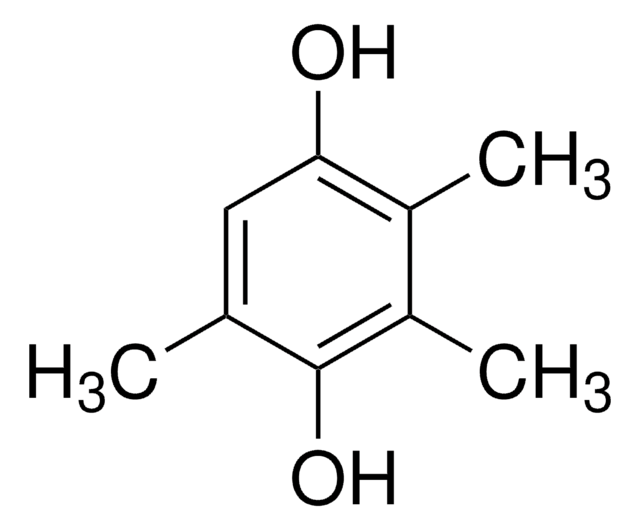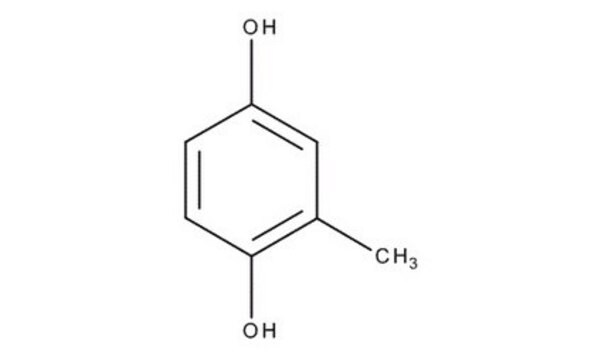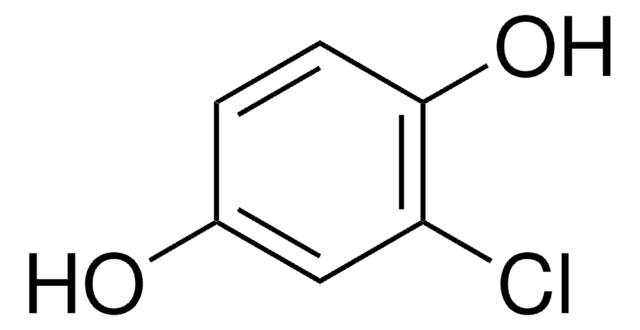300756
2,3-Dimethylhydroquinone
97%
Synonym(s):
1,4-Dihydroxy-2,3-dimethylbenzene, 2,3-Dimethyl-1,4-benzenediol
Sign Into View Organizational & Contract Pricing
All Photos(2)
About This Item
Linear Formula:
(CH3)2C6H2-1,4-(OH)2
CAS Number:
Molecular Weight:
138.16
Beilstein:
636976
MDL number:
UNSPSC Code:
12162002
PubChem Substance ID:
NACRES:
NA.23
Recommended Products
Quality Level
Assay
97%
form
powder
mp
223-225 °C (lit.)
SMILES string
Cc1c(C)c(O)ccc1O
InChI
1S/C8H10O2/c1-5-6(2)8(10)4-3-7(5)9/h3-4,9-10H,1-2H3
InChI key
BXJGUBZTZWCMEX-UHFFFAOYSA-N
Looking for similar products? Visit Product Comparison Guide
General description
2,3-Dimethylhydroquinone is an alkyl p-hydroquinone that can be used as a chain breaking antioxidant and an electron donor for redox intermediates. It acts as an antioxidant due to its characteristic to terminate kinetic chains on reaction with peroxy radicals.
Application
2,3-Dimethylhydroquinone can be used as an antioxidant for lipid peroxidation. It is also used in the synthesis of benzofuran-5-ols which can further be utilized as antifungal agents in biological applications.
Signal Word
Warning
Hazard Statements
Precautionary Statements
Hazard Classifications
Eye Irrit. 2 - Skin Irrit. 2 - STOT SE 3
Target Organs
Respiratory system
Storage Class Code
11 - Combustible Solids
WGK
WGK 3
Flash Point(F)
Not applicable
Flash Point(C)
Not applicable
Personal Protective Equipment
dust mask type N95 (US), Eyeshields, Gloves
Choose from one of the most recent versions:
Already Own This Product?
Find documentation for the products that you have recently purchased in the Document Library.
Customers Also Viewed
Synthesis and antifungal activity of benzofuran-5-ols
Ryu C, et al.
Bioorganic & Medicinal Chemistry Letters, 20(22), 6777-6780 (2010)
Substituted p-hydroquinones as inhibitors of lipid peroxidation
Roginsky V, et al.
Chemistry and Physics of Lipids, 125(1), 49-58 (2003)
Electrochemical oxidation of 2, 3-dimethylhydroquinone in the presence of 1, 3-dicarbonyl compounds
Hosseiny D, et al.
The Journal of Organic Chemistry, 71(5), 2139-2142 (2006)
Marco Persico et al.
Scientific reports, 7, 45485-45485 (2017-04-07)
In the present work we performed a combined experimental and computational study on the interaction of the natural antimalarial endoperoxide plakortin and its synthetic analogue 4a with heme. Obtained results indicate that the studied compounds produce reactive carbon radical species
Alnald Javier et al.
Dalton transactions (Cambridge, England : 2003), 43(39), 14798-14805 (2014-08-28)
Previous studies, based on thin-layer electrochemistry (TLE), in situ scanning tunneling microscopy (EC-STM), high-resolution electron energy loss spectroscopy (HREELS) and density functional theory (DFT) computations, on the chemical adsorption of hydroquinone from aqueous solutions onto atomically smooth Pd (and Pt)
Our team of scientists has experience in all areas of research including Life Science, Material Science, Chemical Synthesis, Chromatography, Analytical and many others.
Contact Technical Service
















